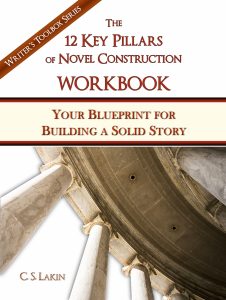The Way to Really Get Ready for NaNoWriMo
With the mayhem of NaNoWriMo (National Novel-Writing Month) approaching, I’d like to encourage writers to avoid wasting time and effort throwing something together in the month of November that’s basically a train wreck.
If your aim is just to complete a “novel” (let’s just call it that for now …) of about 50,000 words in one month, and the only reason for doing so is to feel good about meeting your commitment, then fine. If you don’t care about your final result, then fine. Just write your head off for a month, smile at your accomplishment, then throw the manuscript out.
I’ve been hired by some aspiring authors to critique and/or edit their NaNo product. I do believe it was a waste of their money to hire me to work on something that was such a mess (maybe a fun mess to create) but that had no potential at all to be fashioned into a solid novel.
You’ve heard it from me over and over. Novels need structure. And the best time to lay out that structure is BEFORE you start writing scenes. Put an outline together after you’ve studied novel structure. Use my 12 Key Pillars of Novel Construction book and workbook, and study Layer Your Novel.
Those three books will give you all the basics you need to build your scene outline. Get it done now, in October, and have me critique it. Then you will be ready to roll (at least structurally). There’s also scene structure to master, along with genre. But first things first.
 Let me just share a few tips about writing, in general, from a post I wrote a while back …
Let me just share a few tips about writing, in general, from a post I wrote a while back …
We’ve all heard it said that before you can (or should dare to) break the rules, you need to master them. I agree, for the most part. Some writers have a wonderful style that doesn’t adhere to a whole lot of grammar rules.
Some of those writers bring the flavor of ethnicity to their prose, or, in POV, the first-person narrator lacks a proper education (consider Mark Twain’s characters, for example). There are times when deliberately breaking those rules works.
But a whole novel with fractured or chaotic sentence structure is going to give most readers a headache.
The sentence, to me, is the foundation of all prose. I love a beautifully crafted sentence. I love to be surprised by an unusual, unexpected word. The placement of each word in a sentence can be carefully decided for a specific impression or impact. Moving one word to the beginning or end can change the feel or sentence meaning, even if subtly.
Making Every Word Count
The one-eyed witch in my novel The Unraveling of Wentwater warned, “Take care with your words. They have consequences.” My heroine has to stitch every word back into existence after a spell goes awry and causes the world to vanish. And every time the witch receives a word in payment for a spell she casts, she puts it in a jar and sets it on her shelf. From then on that word no longer exists. The story is all about how important each individual word is.
Words have the power to heal and to hurt. I wonder how many wars have been started, marriages ruined, and murders committed all from the utterance of a single word. As wordsmiths, writers have a serious charge.
Maybe you don’t see yourself in such a capacity, but what if you did? What if you made every word count? Instead of counting words?
Writers these days seem to be all about counting words. About quantity over quality. About pounding out a minimum word count each day instead of searching for the perfect word or working on crafting the perfect sentence. NaNoWriMo can really wrap you up in word counting.
Something is amiss to me when a writer pushes to get five thousand words down on paper or the computer screen in record time—all so she can feel a sense of satisfaction (or post her great accomplishment on Facebook).
Slow Down and Smell the Words
I’d like to encourage writers to slow down. As we barrel along at breakneck speed in our daily routine, it takes (sometimes gargantuan) effort to slow our brains to a crawl. We need to crawl if we are going to notice our world. Maybe even come to a complete stop, to a place of utter stillness, to really notice.
How can we write about anything if we don’t take the time to experience life through our senses? That sensory detail—the things we observe, smell, taste, touch—gets processed, chewed up, and digested as fodder for creativity.
I remember hearing lines like “You’re too young to write a novel. You haven’t lived long enough or experienced enough life to have anything significant to say.” Now that I’m well past the midpoint of my life, I get that. But just because we may be old, it doesn’t mean we’ve been paying attention. Right?
Writing can be a lot like life. We get used to certain things, we fall into routine, we like comfort and don’t challenge ourselves. We don’t want to take risks or stretch ourselves too much as we age. We like that ratty old chair. We vacation in the same place every year. Familiarity is comforting.
But this can filter into our writing and affect our creativity. With an attitude of “I have to hurry and write a lot of words” because our writing time is limited or our lifespan feels too short and “I’m too comfortable and settled in my style and don’t want to push myself,” our writing can start to fossilize.
Attitude and Writing Mechanics
So, really, my focus in this post on writing mechanics has to do with our attitude. Are you always in search of the perfect word? The perfect sentence? Is your goal centered on making sure you meet a target word count or on writing the best story you can?
Attitude greatly affects writing mechanics. If we approach our writing time with a sense of impatience and word-count expectations, how likely is it we’ll write well? Not.
Rushing and Gushing
It’s attitude. Nothing wrong with gushing out a scene, getting it all down before the ideas slip out your ears. Sometimes that feels like rushing instead of gushing.
But there’s a difference.
Writers rush to finish a draft, rush to publish before taking time to carefully go over every sentence and question every word. In their rush they don’t bother to edit, don’t bother to look up the correct use of a word, don’t bother to have readers give constructive feedback. Sure, go ahead and gush, but then go back, slow down, and start sifting through your words.
I see this a lot with my editing clients. Some want to get on the publishing bandwagon yesterday. They’ll inform me their book is now up for sale on Amazon, but they didn’t have the time or money to edit it. Other clients come to me with a proverbial tail between their legs, admitting they did the aforementioned action and after few sales and negative reviews (mostly about how sloppy the writing was), they now want to slow down, get help, learn how to write the perfect sentence and the perfect book (in a manner of speaking).
How much better it would have been if they had ignored word count and focused on words. Ignored the whistling wind urging them to hurry and just plopped down on the ground and closed their eyes and listened to the timbre of the wind. Then they would be in a much better place to be able to describe the wind—and everything else.
Don’t look at the clock. Don’t count words. Make your words count. That is the heart of writing mechanics.
In Conclusion . . .
Words, sentences, paragraphs, and scenes. Those are the components of story. As with any profession, it behooves writers to learn to wield and master the use of the tools of their trade. Work on becoming a proficient wordsmith. Language is our realm, and words are the building blocks of every tree, flower, and character.
Spend time reading beautifully written novels, poems, and short stories. Slow down and taste words; roll them around in your mouth. Show words the honor they deserve and work with them respectfully.
Take time, too, to learn the mechanics of writing so you say what you mean and don’t say what you don’t mean. Aim for excellence, precision, creativity. Don’t settle on the first things that gush onto the page. Go back and make them better. Perfect, if possible.
Often the difference between a good writer and a great one is in the writing mechanics. Don’t let laziness or a lack of interest in grammar and word usage cause you to succumb to this fatal flaw of fiction writing. You owe it to yourself and your readers to master this one.
Sure, have fun barreling along, cranking out a novel in November. But I hope you’ll consider what I’ve just said.
And consider having me critique your scene outline. It takes me about 3-4 hours, usually. But I can guarantee the few hours you put in to create the outline will save you weeks of writing scenes that should not be in your novel. How about crafting a great novel during NaNo that you could actually polish and publish? Wouldn’t that be something?











I was going to do NanNoWriMo this year, but I also signed up for the 100 day Write a book course by The Write Practice. I thought I could do both, but I now know that is not possible. NanNoWriMo is fun and gets people interested in writing, but I have to get serious about writing my book.